Tooth and claw
And if this Doctor should return, then he should beware, because Torchwood will be waiting.
This time I have to plainly say this. Tooth and claw is not among my favorite episodes at all. It’s not that I dislike it for some specific reason – in fact, there are a few things I do like about it, and it is actually quite hard to pinpoint why exactly it doesn’t resonate with me – but overall it fell a bit flat for me. Still, in line with my general attitude, I’ll try to focus on the good parts.
The sacrifice of sir Robert
To me, one of the most important events in this episode is the sacrifice of sir Robert MacLeish. I find it a bit emotional, even if I have some problems with it.
One of these problems is that his sacrifice seems entirely
unnecessary. Granted, he probably stopped the werewolf lupine
wavelength haemovariform for a few seconds, and maybe – just maybe –
these few seconds were exactly what was needed for the Doctor to
manage to set up the telescope light chamber. On the other hand, he
may have treated it as a kind of “penance” for his earlier betrayal –
it probably makes sense for him to consider himself unworthy of living
because of that, and then he decides to punish himself by attacking
the werewolf (knowing that he wouldn’t survive that). I like that
theory even if I think that he didn’t have the right to do that.
The subject of capital punishment is an extremely delicate one, and
I am by no means an expert on it, but I am fairly sure that even if
you consider death penalty acceptable in certain circumstances, it
must follow a thorough and fair trial. It is quite obvious to me that
the old Roman rule that nemo est judex in re sua – “no one can judge
their own case” – applies here. Interestingly, it is usually
understood that any person will gravitate toward a bias favoring
themselves, not the other way round – but people are often biased
against themselves for various reasons. I know virtually nothing
about English law from the Victorian times, but it is entirely
plausible to me that an actual judge would not decide to punish sir
Robert by death, given all circumstances. On the other hand, I can
also imagine a completely different line of reasoning – that sir
Robert died a honorable death he didn’t deserve, according to the
contemporary law and moral standards (which both could well be wrong,
but that’s beside the point). Either way, him deciding himself when
and how to end his own life was wrong, period.
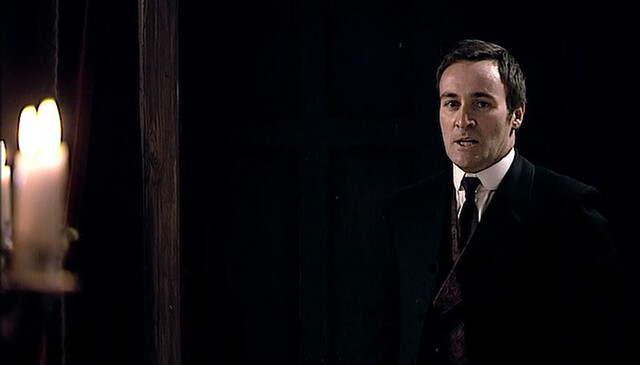
I committed treason for you,
but now my wife will remember me with honour!
That said, I would still not condemn him. The circumstances were extremely difficult, time was scarce, and he must have been under very strong emotions, so his actual moral responsibility must have been diminished by these factors. It is one thing to theorize about morality, which is a good thing to do – in fact, that’s an important reason to engage in art, to be able to assess difficult moral decisions in a safe and comfortable environment of one’s armchair – and another to place the blame on people from the same comfortable environment. Was his decisions wrong? Almost certainly. Was he to blame for making a wrong decision? Maybe, maybe not.
Taken all this into account, another (slight) problem I have with what sir Robert did is very mundane and not really very important… but why did he try to fight the werewolf with a sword, of all things? To a modern man, choosing a melee weapon and not a ranged one like a gun seems a bit stupid. On the one hand, sir Robert clearly saw the werewolf shot multiple times and not hurt by that – but on the other one, the shooting did slow it down considerably, and it retreated for a long while. Of course, the sword looks more dramatic, but using a gun could be much more effective, even if in the end sir Robert would die anyway. Well, Doctor Who has never been big on logic and internal consistency…
Doctor and Rose joking
An important theme in Tooth and claw is that the Doctor and his companions often treat deadly dangers in a strikingly lighthearted manner. We will see this again very clearly at the beginning of spoiler for series 2The impossible planet and of course in spoiler for series 9Face the raven, but this is a topic which is hinted at many more times, for example in spoiler for series 2The runaway bride (Donna’s “Are you enjoying this?” moment), spoiler for series 5The time of angels (when Father Octavian says “And when you’ve flown away in your little blue box, I’ll explain that to their families”) or in spoiler for series 11The woman who fell to Earth (when Grace asks, “Is it wrong to be enjoying this?”).
It is perhaps astonishing that I tend to side with the Doctor here a bit. Yes, there exist very serious situations. Yes, death is not something that should be treated lightly. But that does not mean that we should not approach even very serious topics with some sense of humor. I think it is a wonderful gift of God we can use especially in difficult times to deal with them more easily and with a bit less stress – maybe even with a bit less pain. In fact, jokes and funny comments are an important part of my own life, even if I do face a really grave situation now and then. And I often keep in mind this wonderful quotation from venerable Fulton J. Sheen:
However, there is a close relationship between faith and humor. […] Materialists, humanists and atheists all take this world very seriously because it is the only world they are ever going to have. He who possesses faith knows that this world is not the only one, and therefore can be regarded rather lightly: “swung as a trinket about one’s wrist.” To an atheist gold is gold, water is water and money is money. To a believer everything in this world is a telltale of something else. Mountains are not to be taken seriously. They are manifestations of the power of God; sunsets are revelations of His beauty; even rain can be a sign of His gentle mercy.
Treasure in clay: the autobiography of Fulton J. Sheen, p. 314
So, even though I do understand Queen Victoria’s disgust – after all, she barely escaped death, and Rose, well, was amused, I think she definitely overreacted when exiling Rose and the Doctor. (Not that they cared about it too much.)
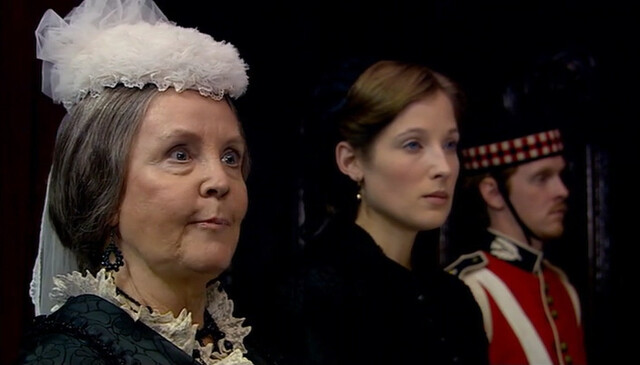
She may have not been amused, but Rose – and us viewers – definitely were.
The value of stargazing
One of the best moments of Tooth and claw is the presentation of the observatory. It starts with sir Robert being a bit emotional about his father (which is completely understandable), becomes funny with the Doctor “being rude again” and Rose trying to win her bet in an embarrassingly heavy-handed way, and then turns quite unexpectedly to philosophical with Queen Victoria’s comment.
This device surveys the infinite work of God. What could be finer? Sir Robert's father was an example to us all. A polymath, steeped in astronomy and sciences, yet equally well versed in folklore and fairy tales.
And in fact, I do agree with her here. It is tempting to only consider trivial issues like sustenance and shelter, but we humans need to spend time on higher matters, too. Science, literature, art, mathematics – and many others – are worth pursuing even if they cost us a lot and gain nothing (at least in terms of immediate and tangible profits).
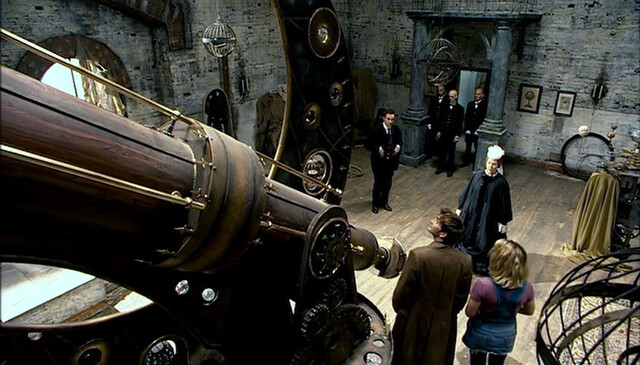
This device surveys the infinite work of God.
And it’s very pretty, even if a bit rubbish, according to some.
Interestingly, the Doctor’s comment – “stars and magic” – is something I don’t like. Of course, conflating “folklore and fairytales” with “magic” is sort of understandable from a secular point of view, but they sound very distinct in my Catholic ears. While studying folklore, local legends and myths can be extremely valuable and help us understand people and their culture better, dealing in actual magic is a very dangerous thing. (Let us put aside the question whether magic actually works and hence is a sin because people practicing it are cooperating with demons, or whether magic does not work and hence it is a sin because people practicing it are lying when they claim they can achieve anything through it. The question is definitely interesting, several hundred years old and deserves a discussion – but I do not consider myself knowledgeable enough to discuss it.)
Coming back to the issue of the value of stargazing and other “pointless” activities like arts and theoretical sciences, let me also mention that this is something I personally sometimes struggle with. On the one hand, there is a widespread attitude of “worse is better”, where it is claimed that it is not economically viable to strive for perfection in a product, since it costs too much. On the other hand, there is a less common attitude that we should offer our work to God, and hence perform it in the best manner we can achieve. Here is how Saint Josemaría Escrivá put it:
It is no good offering to God something that is less perfect than our poor human limitations permit. The work that we offer must be without blemish and it must be done as carefully as possible, even in its smallest details, for God will not accept shoddy workmanship. (Friends of God, 55)
and later:
I used to enjoy climbing up the cathedral towers to get a close view of the ornamentation at the top, a veritable lacework of stone that must have been the result of very patient and laborious craftsmanship. As I chatted with the young men who accompanied me I used to point out that none of the beauty of this work could be seen from below. To give them a material lesson in what I had been previously explaining to them, I would say: 'This is God's work, this is working for God! To finish your personal work perfectly, with all the beauty and exquisite refinement of this tracery stonework.' Seeing it, my companions would understand that all the work we had seen was a prayer, a loving dialogue with God. The men who spent their energies there were quite aware that no one at street level could appreciate their efforts. Their work was for God alone. Now do you see how our professional work can bring us close to Our Lord? Do your job as those medieval stonemasons did theirs, and your work too will be operatio Dei, a human work with a divine substance and finish. (Friends of God, 65)
My problem is, if I were to “finish my personal work perfectly” every time, I would at least get a lecture from my boss, and it would be hard not to agree with him. It would mean that I spend time (and hence money of my employer) on things that do not benefit them, which by the way seems morally dubious to me, too. On the other hand, turning in half-baked products of my work would also be wrong (and bad). What to do, then? Frankly, I don’t have a good, universal answer. Maybe it is just a question of experience and wisdom to know when to stop perfecting a piece of work and decide it is good enough?
Before I move to the next topic, let me mention something slightly more light-hearted I learned about recently. There is a small station on one of the Japanese railways, called the Seiryu Miharashi Station, which does not have any roads (or even paths) leading to it. In other words, after you get off the train there, the only way you can leave it is board the train again. The only purpose of existence of the Seiryu Miharashi Station is as a viewing platform for the Nishiki River. I do not know much about the Japanase culture, but I love this example of spending a lot of money only to make it easier for people to appreciate the beauty of nature.
Mercy killing?
Death and sacrifice is a very common topic on Doctor Who. It is not surprising, that another death-related concept, the mercy kill, appears in the show, too. This is an important topic – especially in today’s world – where many people consider it acceptable to kill someone so that they can avoid suffering. Tooth and claw is (I think) the second episode of New Who (the first being Dalek) dealing with that subject, but definitely not the last. Did the Doctor do right when he essentially killed the boy who became the werewolf? Essentially, the concept of mercy kill is fundamentally incompatible with Catholicism – the right thing to do is to accompany a dying (and suffering) person as best as we can, not to shorten their life. I already mentioned the concept of not performing so-called “over-zealous treatment”, which is very distinct from euthanasia, but this is not the case here. Can we justify the Doctor complying with the boy when the latter begged him to “let him go”? I gave some thought to it, and I honestly don’t know. I think it may be justified as legitimate defense – after all, the wolf was intent on bringing the Empire of Wolf to the Earth, and presumably killing many (or all) humans. Containing it could be impossible (or at least extremely hard, without a good chance of succeeding), sending it elsewhere would be immoral (since it would probably just wreak destruction there), so killing it may have been the only viable option of defending the Earth – and apparently, it could not be killed without killing the poor boy at the same time… I don’t envy the Doctor that choice! I just hope I’ll never face a man turned werewolf, with the choice of killing the wolf without being able not to kill the man!
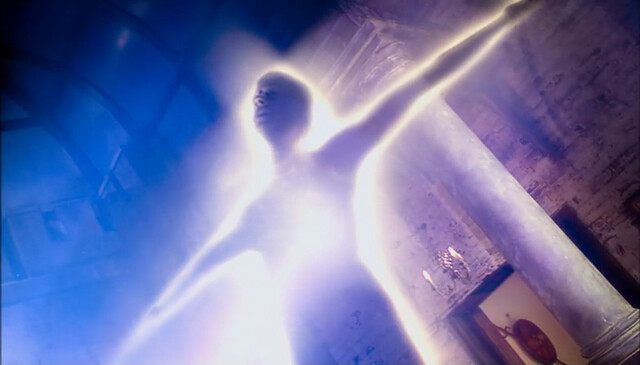
Unlike The end of the world, the cross-like imagery here
does not seem to make much sense.
Other tidbits
As usual, in this section I’ll just briefly mention a few things that caught my attention, but for this reason or another I did not discuss them at length.
The scene with the monks fighting in an Eastern style is so utterly absurd and ridiculous that I genuinely don’t know what to say about it. I wonder what the thought process of the writers looked like. “– Let’s have these Scottish monks fight like stereotypical ninjas. – Ok, but let them be orange instead of black. – Great, but why a Christian monk would know martial arts? It doesn’t make any sense! – You’re writing for Doctor Who, you’re not paid for making any sense!”
And then the Doctor wants to take Rose to 1979, only ending up in 1879 instead. The subject of the T.A.R.D.I.S. “not being very reliable” will be brought up in the future, but here’s another thing. In quite a few episodes (first in Boom town, I think) we learn that the T.A.R.D.I.S. is not just a mechanical device, but (at least partially) a living creature. Does she not mind the Doctor repeatedly hitting the console with a hammer, then? I really don’t want to get deeper into that…
While I already said that I’m not a big fan of risqué jokes, I find the running gag about Rose’s “nakedness” actually pretty funny. Of course, what’s really funny is Rose trying to speak with a Scottish accent and the Doctor (or was it David Tennant?) being, well, very much not amused. spoiler for series 7This starts a trend continuing with several companions of Ten, and sets up an absolutely hilarious scene in The Rings of Akhaten where Eleven has the exact opposite attitude.
The “I’m Doctor James McCrimmon, from the township of Balamory.” quip seems not very funny unless you know that Jamie McCrimmon was an actual companion of the Second Doctor, and Balamory is a fictional place from a Scottish children tv show of the same name.
Another sentence from the Doctor – “I trained under Doctor Bell himself” – was a little baffling for me. Initially, I assumed it was about Alexander Graham Bell, who was indeed Scottish, but only received a (honorary) doctorate of the University of Edinburgh in 1906. In fact, he was only 32 in 1879. (And this, by the way, would not be the first time that Bell is mentioned in New Who.) After consulting the T.A.R.D.I.S. wiki, I learned that I was wrong – it was Doctor Joseph Bell, who actually worked at the University of Edinburgh and was an inspiration for Sherlock Holmes.
The bet Rose made with the Doctor that Queen Victoria would at some point say that she is not amused was another great joke – made even better by the fact that Doctor clearly lied about the reasons he didn’t want to make that bet. Of course, Rose repeatedly trying to make Her Majesty to say the thing – and Doctor’s being more and more exasperated – were hilarious, too.
The “Am I being rude again?” quip from the Doctor was a great callback to The Christmas invasion. Such little nods to past episodes are among my favorite parts of the show, and it does deliver on that front.
Speaking of callbacks, it’s hard not to mention Rose remembering to ask Flora her name. Time and time again she shows that she cares about people, and asking them their names is a very good way of showing that. In fact, names are a big deal in Doctor Who, and I’m all for it – being steeped in Biblical tradition, I love when various works of art take up this subject.
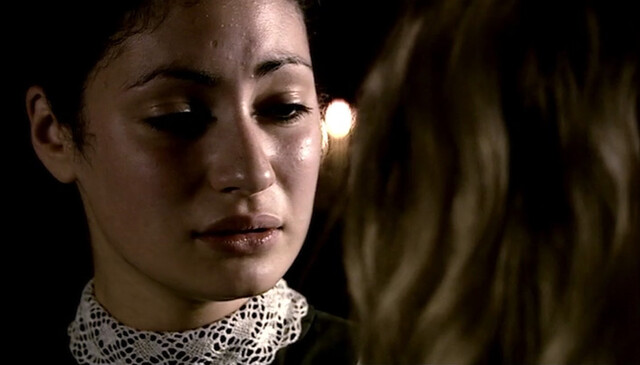
Frankly, after Rose asked Flora her name and almost promised her
safety,
it was rather astonishing that the girl survived until the end of the
episode…
I also liked the moment when Rose said about the werewolf that “He's a prisoner. He’s the same as us”. Again, it showed her compassion. Here was what was basically a monster to lady Isobel and other captives – but Rose sees that he is enslaved, like them, and felt compassion for him, too. (The fact that the werewolf – or the lupine wavelength haemovariform, if you like – broke out of the cage with ease is irrelevant here, since Rose couldn’t have known that.) There is actually a deeper spiritual meaning behind this. In a villain-and-victim scenario, they are in fact always both victims. Every perpetrator harms primarily themselves – yes, they can kill the [victim’s] body, but in doing that, they are destroying [their own] soul, (compare Matthew 10:28). Obviously, this does not negate the fact that the victim deserves compassion and help, and that justice demands that the perpetartor is punished – but it does mean that the perpetartor needs compassion, too, even if they might not deserve it. (And frankly, I wouldn’t be sure about them not deserving it, either. This is a difficult topic, and I really hope to get back to it – this tends to come up in Doctor Who quite a few times, for example in spoiler for series 4Partners in Crime, spoiler for series 4The next Doctor, spoiler for series 5The vampires of Venice, spoiler for series 5Vincent and the Doctor, spoiler for series 6The rebel flesh/The almost people, spoiler for series 6The God complex, spoiler for series 7The bells of Saint John, spoiler for series 7Time heist, spoiler for series 8Mummy on the Orient Express, spoiler for series 9The Zygon invasion/The Zygon inversion – but probably most notably in spoiler for series 7A town called Mercy.
And speaking of the werewolf, the whole exchange between him and Rose is really good. From his “oh! intelligence!” to the mention of Bad Wolf, the whole scene is great. Not to mention the transformation itself, which looks really cool – you can tell that Doctor Who went a pretty long way since burping trash cans as far as the special effects go.
One of my favorite parts of the episode is the story of lady Isobel and her husband sir Robert. We don’t get too much of a backstory here, but what we can see from a few glimpses is really compelling: he is an honorable man, she is a resourceful woman, and what is most important, you can see how they love each other. I have a strong suspicion that their kiss in public was not something that would actually happen in Victorian times (though what do I know?), but you know what? I don’t care at all. As a married person myself, I love it when movies or tv shows have happy marriages. And I also like the fact that it’s important to sir Robert that his wife “will remember him with honour” – and though it is not mentioned explicitly, my personal headcanon is that she, in fact, did. It is yet another very subtle reminder that love transcends death.
One very minor tidbit I loved was that even when their leader was killed, the “brethren” just continued to work. This is a mark of a good organization, and villains or not, their competence must be applauded. I’ve seen many times a scenario when a visionary leader would start something great, and then after they die (or just get bored, or change jobs, or leave the project what whatever reasons), there is nobody to step into the role and the project crumbles. (I have to admit that I even was that leader once or twice – on a very small scale, of course, and I didn’t die, of course, just went on – but the mechanism stays the same.)
As a chronic bookworm, I cannot not love when the Doctor exclaims: “Books! Best weapons in the world.” This, in fact, is very true – while swords and guns can win battles and even wars, ideas are what wins in the long term. (History of the Church is an obvious example, but far from the only one. There are quite a few examples of civilizations conquering other civilizations only to absorb their ideas – language, beliefs, way of living.)
It was interesting to hear Queen Victoria say “I would destroy myself rather than let that creature infect me”. While understandable, it obviously makes me feel a bit uneasy – after all, killing oneself on purpose, a.k.a. suicide, is something that should not be taken lightly. As I have already mentioned twice on this weblog, this is another very difficult subject. I would presume that if you were a powerful monarch and a target of a werewolf-slash-alien evil creature who wants to install itself in your body to take your power and use it to destroy the Earth, you could be morally justified in killing yourself in order to avoid that, but I would not be surprised to hear some argument countering that.
I also noticed Her Majesty describe the Koh-i-Noor as “the spoils of war”. I am no history expert, but I think that could be said about quite a few things in Great Britain. I am definitely not competent enough to discuss this, but the question of what and how should be restored after taken by force after various conflicts seems an important one. (Well, as a citizen of a country which was much more often on the receiving end of various wars than an aggressor – in fact, that happened maybe once, maybe twice in our history – I’d naturally like some justice here – but I don’t hold my breath…)
And right after bringing up this heavy subject, we have a lovely piece of black humor from the Doctor – when the Queen says about the diamond that “it is said that whoever owns it must surely die”, he points out that “that's true of anything if you wait long enough”. It was hard not to laugh at this one! Of course, Doctor and Rose commenting on what might happen if Jackie was there was also pretty funny.
Another thing I absolutely loved is the scene of sir Robert’s death. In a blink-or-you’ll-miss-it moment we can see the Queen clutching a small cross and praying. This, my friends, is one of the best possible reactions when you see (or hear) someone die and you can’t do anything about it.
And of course, in the final moments of the episode, Queen Victoria banishes Doctor and Rose and says, “your world is steeped in terror and blasphemy and death, and I will not allow it. […] you will reflect, I hope, on how you came to stray so far from all that is good, and how much longer you may survive this terrible life”. Seeing Rose laughing at the idea that the royal family might be werewolves just a few minutes later makes one think that Her Majesty was not entirely wrong…
Finally, there are some absolutely fantastic pieces of trivia related to this episode. For example, it gave the actress Pauline Collins a record for the longest interval between appearances on Doctor Who – she played a certain Samantha Briggs in the Second Doctor’s story The faceless ones, aired in 1967, and Tooth and claw, where she played Queen Victoria, aired in 2006. (This record was broken a few years later by Arthur Cox.) Also, I read that mistletoe is not something you’d naturally encounter in Scotland, which means that sir Robert’s father must have imported it on purpose to guard the house against the werewolf. And finally, this episode has a very nice callback to World War III, where Jackie Tyler commented that Rose should be knighted.
Last but not least
Now, this article is already much longer than I expected, especially given that Tooth and claw is not one of my favorite episodes. But there is one last thing I have to mention. When the company sit down and eat, we get this beautiful little speech by Queen Victoria about ghost stories.
And that's the charm of a ghost story, isn't it? Not the scares and chills, that's just for children, but the hope of some contact with the great beyond. We all want some message from that place. It's the Creator's greatest mystery that we're allowed no such consolation. The dead stay silent, and we must wait.
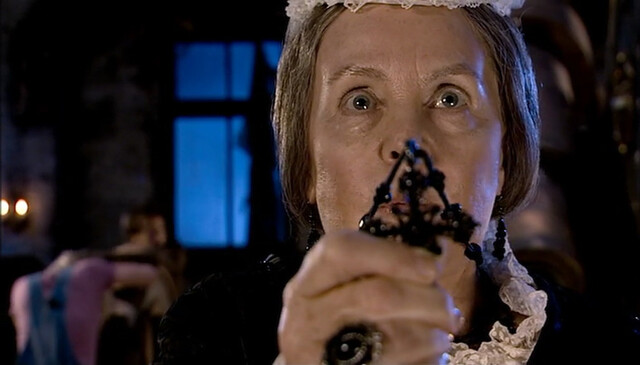
Queen Victoria contradicting herself, since prayer for the dead
is actually a form of contact with them – through God
And you know what? I said it was beautiful, yes, but not that it was true – since it’s not. The dead do not stay silent, since there was one Man who died and then came back to tell us “Peace be with you.” If that is not a consolation, I have no idea what is!